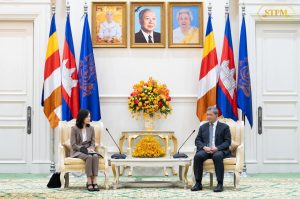South Korea’s government says that it is preparing to impose financial sanctions against Cambodia-based entities that have been accused of involvement in online scamming operations and related crimes.
According to a report by Chosun Daily, South Korea’s Financial Intelligence Unit, a part of the country’s Financial Services Commission, is reviewing measures to designate the criminal networks behind Cambodia’s explosion of online scamming centers.
“We will begin financial sanctions against these groups as soon as interagency consultations are finalized,” Chosun Daily quoted on official as saying yesterday. Another Korean media report suggested that this could take place “within the month.”
Currently, the groups under consideration for sanctions include the Prince Holding Group, one of Cambodia’s most prominent conglomerates, and the Cambodia-based financial services company Huione Group. Prince was the subject last week of an unprecedented joint action by the U.S. and U.K. governments, which the U.S. Treasury Department described as the “largest action ever” to disrupt Southeast Asia-based scamming operations.
The U.S. government announced sanctions on 146 individuals and entities linked to Prince, including its 37-year-old chairman Chen Zhi, alleging their involvement in cyberfraud, human trafficking, and money laundering. U.S. federal prosecutors also indicted Chen for wire fraud and money laundering, seizing $15 billion worth of bitcoin linked to the Prince chairman. In a parallel announcement, Treasury’s Financial Crimes Enforcement Network (FinCEN) cut off Huione Group from the U.S. financial system, alleging that it had “laundered proceeds of virtual currency scams and heists on behalf of malicious cyber actors.”
The British government simultaneously announced sanctions on six entities and individuals associated with the Prince Group and froze 19 London properties worth more than 100 million pounds ($134 million) that it had connected to the network.
The announcement came shortly after a South Korean delegation led by Vice Foreign Minister Kim Jina and National Security Advisor Wi Sung-lac traveled to Cambodia to secure the release of nationals being held in scam compounds against their will. A group of 64 South Koreans were subsequently extradited from Cambodia to South Korea on Saturday. Korean officials say that most face investigation, to determine whether or not they were “voluntary” participants in online scams.
In recent years, Cambodia has become a hub of online fraud operations, which are run predominantly by Chinese criminal syndicates and rely on a huge corps of trafficked workers from across the globe. Despite periodic crackdowns, these operations have flourished due to the protection of senior government officials and prominent tycoons with close links to the ruling Cambodian People’s Party. For instance, Chen Zhi, the chairman of Prince Group, has served as an advisor to former Prime Minister Hun Sen and his son Hun Manet, who took over the office of prime minister in 2023. (The Cambodian government denies any involvement in online scamming operations.)
South Korean authorities estimate that about 200,000 people, including around 1,000 of their nationals, work in Cambodia’s scam centers.
The increased South Korean actions follow the alleged murder of a South Korean college student who was reported kidnapped in Cambodia by a crime ring. Park Min-ho, 22, was found dead in a pick-up truck in southern Cambodia on August 8. A subsequent autopsy revealed that he “died as a result of severe torture, with multiple bruises and injuries across his body.”
Park’s death prompted the Korean government to issue a “code black” travel ban to some regions of Cambodia. Its Foreign Ministry also summoned the Cambodian ambassador earlier this month to voice its concerns over the “continued occurrence of job scams and detention of South Korean citizens in Cambodia, and urged the Cambodian government to come up with swift and practical measures to eradicate online scams,” the country’s Foreign Ministry said in a statement.
In a report published in June, the rights group Amnesty International described the Cambodian government’s response to the scamming scourge as “grossly inadequate” and accused it of being “complicit” in the industry’s abuses.
The increased Korean attention to the issue may be an early sign that last week’s sanctions action could catalyze more robust international efforts aimed at pressuring the Cambodian government into a genuine anti-scam crackdown. While the Cambodian government has pledged cooperation on the issue – Prime Minister Hun Manet said last week that the two nations “will continue to strengthen our collaboration to prevent, suppress, and combat online scams more effectively” – its past track record of lassitude suggests reasons for skepticism.





























